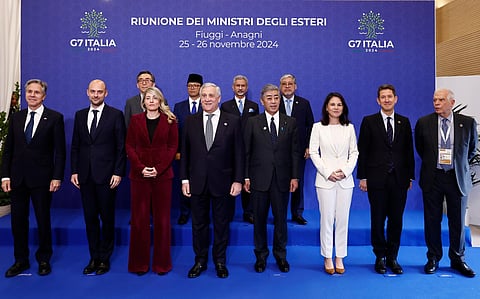Jaishankar says Indo-Pacific landscape calls for wider collaborative approach, terms G7 as partner for it
ROME: Noting that the evolution of Quad has been a notable development, External Affairs Minister S Jaishankar has said the Indo-Pacific is experiencing 'significant changes' including new convergences and partnerships.
In an era of collaborative endeavours, the Indo-Pacific will require practical solutions, nimble diplomacy, greater adjustment and more open conversations.
The G7 can be one such partner, Jaishankar said as he attended the G7 FMM Outreach Session with Indo-Pacific partners in the Italian city of Fiuggi on Tuesday.
The Quad is a major grouping of Australia, India, Japan and the US.
The External Affairs Minister was in Italy on an official visit from November 24 to 26 to participate in the Outreach session of the G7 Foreign Ministers' Meeting, where India was invited as a guest country.
The evolution of Quad has been a notable development and the Indo-Pacific landscape today creates a compelling argument for a wider collaborative approach, Jaishankar posted on X after the session and outlined what he termed as six key responses required in the Indo-Pacific region.
These included more collaborations in areas such as maritime, semiconductors, supply chains, etc.; more resources, both to support greater activities and projects as well as to avoid bad borrowing and unsustainable debt; more capacities in fields like governance, health, technology, disaster resilience and natural resource management, and more inter-operability and burden sharing to service the global commons and contribute to global good.
Jaishankar's post further added on the six responses: Respect for international law as well as for mutuality of benefits and more options so that Indo-Pacific policymakers are able to make the right choices.
In September, top Quad leaders had unveiled major steps to expand maritime security cooperation in the Indo-Pacific with Prime Minister Narendra Modi asserting that the grouping is for a rules-based global order and respects the sovereignty and territorial integrity of nations.
In the annual Quad summit, hosted by the outgoing US President Joe Biden at his hometown state of Delaware, the leaders, without directly naming China, expressed serious concern over the situation in the East and South China Seas and condemned the dangerous use of coast guard and maritime militia vessels.
Before the Session, Jaishankar also met Tajani and discussed opportunities in technology, innovation, clean energy, fertilizers, railways and investments.
Also exchanged perspectives on IMEC, Ukraine and the Indo-Pacific.
The recently announced Joint Strategic Action Plan guides our activities, he said in a post on X and added that he looked forward to welcoming Tajani in India in 2025.
Jaishankar also met his Japanese counterpart Takeshi Iwaya and exchanged views on advancing our strategic partnership and cooperation in the Indo-Pacific, and caught up with South Korean counterpart Cho Taeyul to appreciate our growing convergences on the Indo-Pacific, vibrant economic partnership, strong defence ties and active tech collaboration, he said in separate posts on X.
The EAM had earlier in the day met US Secretary of State Antony Blinken and discussed the state of the world and the India-US partnership, which, he said, continues to move forward.
Jaishankar also met counterparts from several other countries, including the UK, France and Ukraine, and discussed ways to deepen cooperation in multiple sectors as well as regional and international developments.

